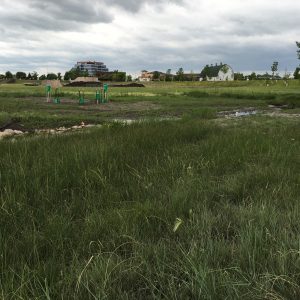The Fargo Project aims to build a road map for modifying infrastructure within the City of Fargo to provide necessary hydrologic benefits and adding ecologic and social benefits to selected sites. In 2016 through 2020, professors and graduate students from NDSU will conduct research within the first of these sites, World Garden Commons, a stormwater basin at Rabanus Park.
Meet Jesse Riley, he’s a PhD graduate assistant whose passion and research is urban ecology. His research falls under Drs. Christina L.M. Hargis and Jack E. Noland, Natural Resources Management NDSU. Jesse and his social entrepreneur team won the 2016 NDSU Innovation Challenge with “Carbon Negative” a system of planting prairie vegetation in underused public land for carbon sequestration. His research at World Garden Commons has three major objectives: water quality, determining the best vegetation for future basins, and to assess the value neighbors, engineers, planners, artists and partners place on the aesthetics of developing an urban prairie.
Water Quality
Jesse will assess groundwater quality changes during the wet seasons of 2016 and 2017 through samples analysis taken from collection stations along the channel bed. In addition, he’ll assess the water quality of the stormwater flowing into and out of the basin to verify if the water quality improves through the system. Samples will be taken at varying depths as the basin fills and recedes.
Vegetation
Seeding and seed costs can be expensive – especially in an area where flooding occurs periodically and where harsh chemicals cannot, or will not, be used. In the spring of 2016, twenty-five test plots were established to measure the best vegetation based on establishment, resisting encroachment, hardiness, and durability for stormwater basins. The results of the study can have implications across the region.
Social
The activities and people who developed the World Garden Commons include people with different interests: artists, civic groups, government, professions and neighbors. Their relationship with the urban environment can be positive and encourage sustainable use. Jesse’s research includes gauging their ideas and perceptions useful in understanding how to expand this project into other places in the city.

Vegetation plots test establishment, resistance to encroachment, hardiness, and durability for stormwater basins
Check back for updates and additional research projects at World Garden Commons.



bobbi aguero June 29, 2016
Great idea put into action!
Cali Anicha July 10, 2016
So thrilled this is happening in our community! Looking forward to this Tuesday night Fargo Project Party in the Park Rabanus!!!
Staff Rachel Asleson July 11, 2016
We are too Cali! See you at Rabanus Park’s Party in the Park 5:30-8:00 Tuesday 7/12/16!